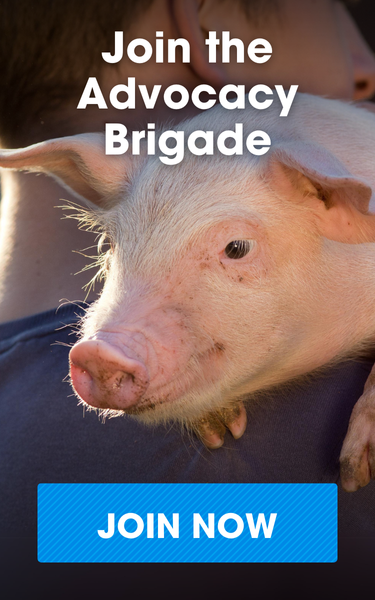
Celebrating 2024’s Progress for Farm Animals

Thank you for each action you took to help billions of farm animals this year. With your advocacy, we made progress toward ending the brutal factory farming of chickens, pigs and cows, and we collaborated with farmers and consumers to build a more humane food system.
2024 was a year of progress for farm animals. Here’s what we accomplished together:
We held the biggest supermarkets accountable for how they impact farm animals.
Our second-annual Supermarket Scorecard was unveiled in August, evaluating the 25 largest grocery store chains in the U.S. on their actions to address issues critical to farm animal welfare. In addition to scoring stores on their cage-free and other policies, the latest scorecard provides a list of higher welfare store brand products.
Supermarkets with no public commitments to farm animal welfare were told by more than 60,000 ASPCA supporters that it's time to move to more humane products, rather than offering only those made from animals suffering in the worst conditions.
We helped to bring higher-welfare products to conscientious consumers.
Our Shop With Your Heart Grocery List expanded with more than 40 new brands and over 100 new products.
Animal welfare-certified products became easier to access when ButcherBox, one of the country’s largest meat delivery companies, announced it was sourcing all major proteins from farms and ranches that hold ASPCA-recognized, third-party animal welfare certifications. Additionally, ButcherBox became the first subscription meat service company to offer a healthier breed of chickens.
To make it easier for shoppers to find better options wherever you live, we listed delivery services for welfare-certified products and plant-based meals.
We collaborated with the egg industry to move away from the needless killing of male chicks.
Half of the chicks hatched to supply the egg laying hens of the egg industry are female. The other half are male and do not lay eggs. To the egg industry, male chicks have no purpose. They are routinely, violently killed at hatcheries in astounding numbers: over 310 million every year. The ASPCA is the leading animal welfare non-profit organization working with the egg industry to end the culling of male chicks. In 2024, we collaborated with major egg manufacturers like NestFresh and Kipster to bring new technology to the U.S. called in-ovo sexing, an innovative tool that identifies the sex of a chick before it hatches. We also collaborated with Certified Humane®, a third-party certification company, on its new in-ovo sexing standard — the first in the U.S.
We supported Global Animal Partnership (G.A.P.) in phasing out inhumane chicken breeds.
The ASPCA helped one of the largest animal welfare certification programs in the U.S. implement a plan to phase out conventional Cornish Cross breeds from its certification. Cornish Cross are the most commonly used chicken breed and are known to suffer because of how quickly they grow. The ASPCA is dedicated to working with farmers and producers who want to or have already transitioned to healthier breeds. These companies are recognized within our Shop With Your Heart grocery list.
We moved more of the pet food industry away from factory farming.

Launched last year, our Higher-Welfare Pet Food Initiative expanded to help consumers find pet food brands that are committed to improving farm animal welfare. Pet food and treat companies, Wild Nosh and Evermore Pet Food, joined Campfire Treats as the only three pet food companies to meet the standards of the Better Chicken Commitment — an essential measure of welfare for chickens. We continued working behind the scenes with pet food brands to help them meet their pledges for animal welfare. Additionally, we added eight new brands and 36 pet products to our list of higher welfare foods and treats.

When hurricanes Helene and Milton flooded areas of the Southeast, we were touched by a generous donation of over 20,000 lbs. of welfare-certified pet food from Open Farm Pet Food to assist our efforts in Asheville, North Carolina. The donated food supported our partner organizations and fed hundreds of animals in need of help.
We advocated for funding and clearer labeling to help higher-welfare farmers.
From our work on the Farm Bill to a new federal bill called the Industrial Agriculture Conversion Act (IACA), the Good Food Bill in New York and a climate bond ballot measure in California, the ASPCA championed investment in farmers who are farming or who want to farm more humanely.
We also continued our decades-long work to improve federal regulations concerning animal welfare claims on food products, responding to updated USDA guidelines that weren’t strong enough to ensure that animal welfare claims like “humanely raised” and “free range” actually match consumer expectations.
Learn more about other 2024 legislative victories helping farm animals.
ASPCA grants supported the fight against factory farming and farmers who are committed to more humane practices.
Each year with help from our generous donors, the ASPCA awards grants to farmers and organizations who are helping to end factory farming. The ASPCA Fund to End Factory Farming Grant funds innovative approaches to exposing and solving the factory farm crisis. This year, we awarded grants collectively totaling more than $114,000 to four noteworthy and deserving organizations.
We also partnered with the Food Animal Concerns Trust (FACT) to underwrite 18 Fund-A-Farmer Grants to farmers who want to obtain or who already hold a meaningful animal-welfare certification. This annual grant raises the number of ASPCA-supported farms through FACT to 128 since 2017, improving the lives of over 100,000 farm animals. These grants help build a more humane farming system so we can eventually close the chapter on cruel and unsustainable factory farming.
Join our Factory Farming Task Force today to help end factory farming and make the world a better place for animals!

